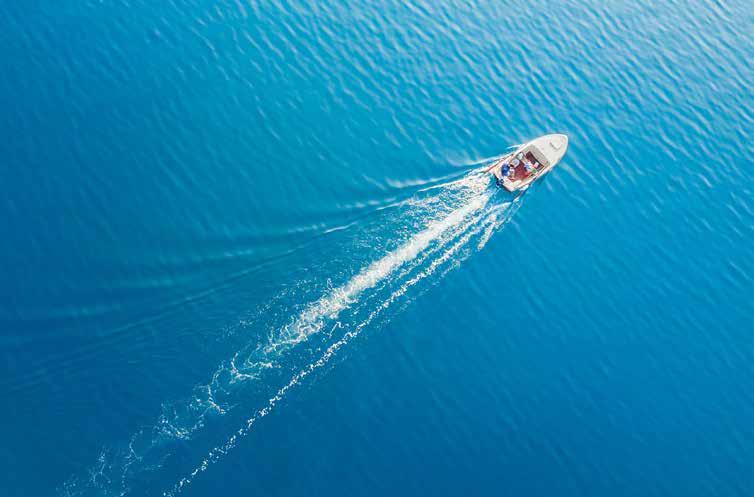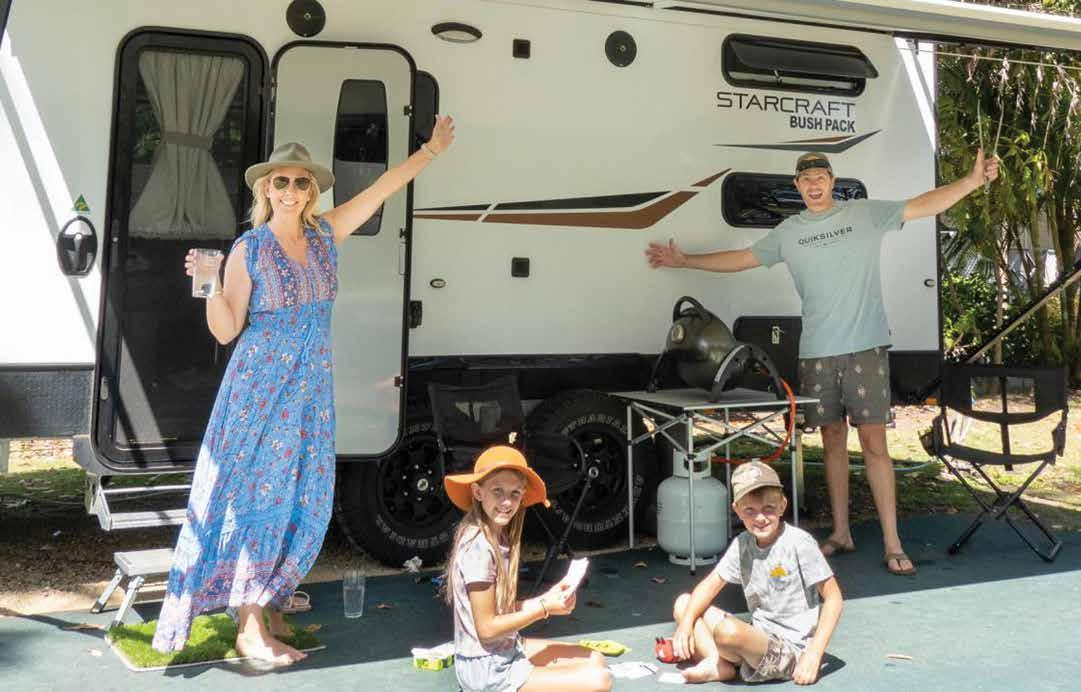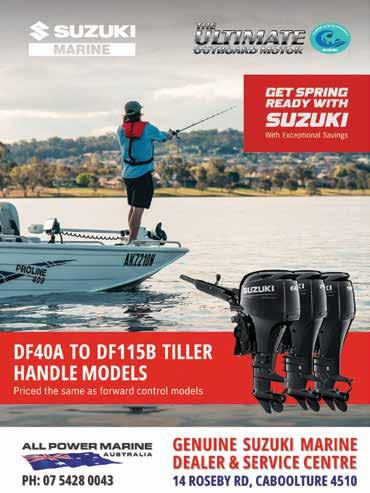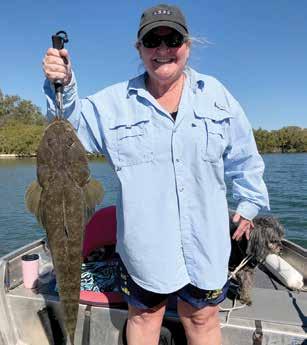
5 minute read
Fishy Facts - Lures Vs. Bait Part 2
Just as artificial powerbaits have made baitfishing in freshwater more ‘novice’, so has the use of artificial baits, or soft plastics made lure fishing less technical for novice lure anglers. As mentioned earlier, many of these soft plastic ‘baits’ blur the line between bait and lure, many of them are scented and edible, and can actually be fished statically so fish pick them up and chew on them. The upside of lure fishing is that it is generally a ‘cleaner’ fishing method where there isn’t any necessity to collect, use or store ‘smelly’ baits. A wide variety of lures can be collected and easily stored in convenient tackle boxes and carried about and used whenever required without the need to ‘buy or collect’ fresh bait before every fishing trip.
The downside of lure fishing is that it can be expensive if you start using (and collecting) intricate hard-bodied swimming lures that can be lost on snags and fish etc. Using soft plastic lures is far more economical (and just as effective) as the jig heads and the soft plastic tails are less intricate in their manufacture and therefore less expensive.
Advertisement
The same basic, light to medium spinning rod, reel and line outfit is perfectly suitable for lure casting (hard and soft) for most bread and butter, salt or freshwater fish species. A straight monofilament line to lure rig is perfectly adequate to get started and catch fish.
To summarise, there are no hard and fast rules as to when one method is better than the other. If you’re taking the kids on holidays to the beach, and want to have fun and catch a few, then my suggestion would be to start them off using bait to chase bream and flathead etc. It’s possible to set up a few rods and keep all the children close at hand around the water while fishing from the beach or jetties. Safety around water should be a key factor where kids are involved. As they grow, and if they show a keen interest in fishing, then getting them started using soft plastic or basic lures and chasing easily caught fish such as flathead in saltwater or redfin in fresh, can kick-start their lifetime fishing adventures.
If you’re just after a feed of fish, then you can’t go past fresh bait and local fishing advice. If you’re more interested in moving about and putting the odds back in the fish’s favour, making your fishing more challenging, and releasing more fish than you keep, then lure fishing is probably for you.
No matter what method you choose, make it enjoyable, fish responsibly, take your rubbish home with you, don’t leave discarded fishing lines, hooks or plastic packaging lying around, and most importantly, limit your kill.
Gone are the days when it was only the retired who owned a caravan. More and more people now turn to caravanning for their family holiday. There are so many places to adventure to, no matter whether you’re going for a short trip or for several months and travelling in a van is just that much more enjoyable!

Whilst you might be excited to jump in your new van and head off, there are a few things you should plan before taking off. We’ve put together a checklist to help you not forget the important things and we’ve included a few hints and tips from the pros.
CHECKLIST
• Ensure you have a fire extinguisher and fire blanket on board.
• Make sure you have a well-equipped toolbox including a mallet, screwdrivers, tent pegs and clothes pegs, a long power cord, a power board, guy ropes (they can be used as a makeshift clothesline) and annexe matting.

• Citronella candles, mozzie repellent and sunscreen
• 12V chargers for any of your electrical items (don’t laugh, we’ve all forgotten them!)
• Some vans don’t have a toilet or shower. If this is yours take a 12V shower (or Hot Water on Demand if you want the very best) and a portable toilet for when you’re in remote areas with no facilities
KITCHENWARE
• Take some small-sized containers and plastic wrap to keep leftovers and any open items in the fridge.
• If you love to cook over an open fire (when permitted) include a jaffle iron and camp oven
• Gas lighter and matches.
• Torches and spare batteries
• Take a spare portable stove or BBQ to cook outside; fish can be especially smelly to cook and if you cook it outside the smell won’t go through your bedding, clothes and linen
FOOD
(Just a few items that sometimes get forgotten)
• Salt and pepper
• Sauces – tomato, BBQ, mayo etc.
• Tea, coffee and sugar
• Rice, pasta and oil
• Canned food is great as space is limited when you have a small fridge. Try corn, peas and fruit.
• Long-life milk
CLOTHING MUST-HAVES
• No matter how warm the weather is, always take at least one tracksuit for those cooler nights or an unexpected change.
• One good outfit for special occasions
• Hat and beanie
• Swimmers
• Sandals, hikers, outdoor slippers, Crocs or a pair of thongs to wear to and from the shower.
RIGHT BEFORE YOU GO.
• It’s a good idea to have your vehicle serviced before you go, especially if you’ll be away for a long period of time.
• Check that your gas bottles are full, securely fastened and turned off.
• Make sure the fridge door is locked and don’t leave anything out on the benches or shelves as they will get thrown around during transit.
• Lower your TV antenna (if it’s not fixed in place)
• Attach your caravan mirrors ensuring they are firmly secured and make sure you can see adequately before moving off.
• Ask someone to stand outside and check that the brake lights, indicators and headlights are all operational
• Make sure all the windows and hatches are latched.
HANDY HINTS & TIPS FROM THE PROS
• Line your kitchen cupboards & drawers with non-stick rubber matting to stop cutlery and kitchenware from moving during travel.
• Have a second set of everything that stays in the van so that all you need to pack for each trip is your food and clothes.
• Before you go transfer all your food items into plastic containers to save any broken glass in transit
• Carry a second cast iron frying pan that can be put directly onto an open fire. This saves your good one.
• Keep a dirty clothes bag so you can carry your laundry to and from the laundry mat.
• Take a large plastic storage box with you for all your tent pegs, annexe matting, rope and chocks, as you may need to pack up when wet.
Elké Swain caught this 80cm flathead off a lure when fishing to the left of Little Goat Island. It was safely returned as it was over the legal limit. Unfortunately, Elké wasn’t aware of how to hold it properly, but she does know now, so next time she said she will do it right! Elke’s first catch on a lure 15mins prior was 37cm and she had to put it back and on her second go she caught this beauty. Elké said,
“My heart was racing for about 15mins afterwards, I was so excited and exhausted, she put up a good fight.”










